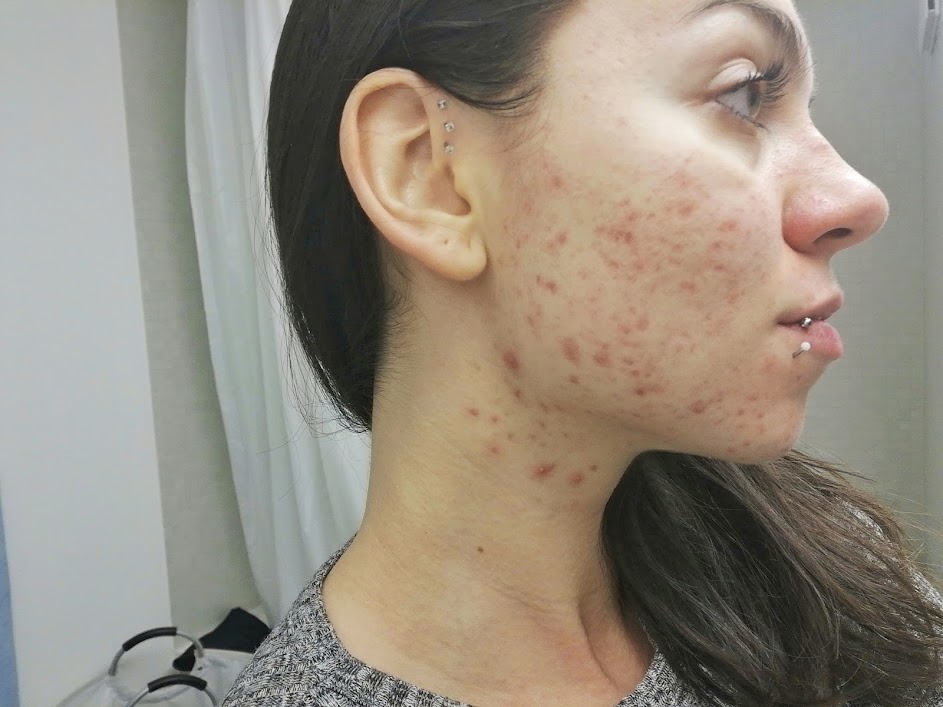Are you struggling with hormonal acne ? Do you feel like you’ve tried every possible remedy out there, and still, nothing works? Then this article is definitely for you as I’m sharing how I cured my acne naturally.
I was in the exact same boat back in 2018 when I got the worst acne of my life after going off birth control.
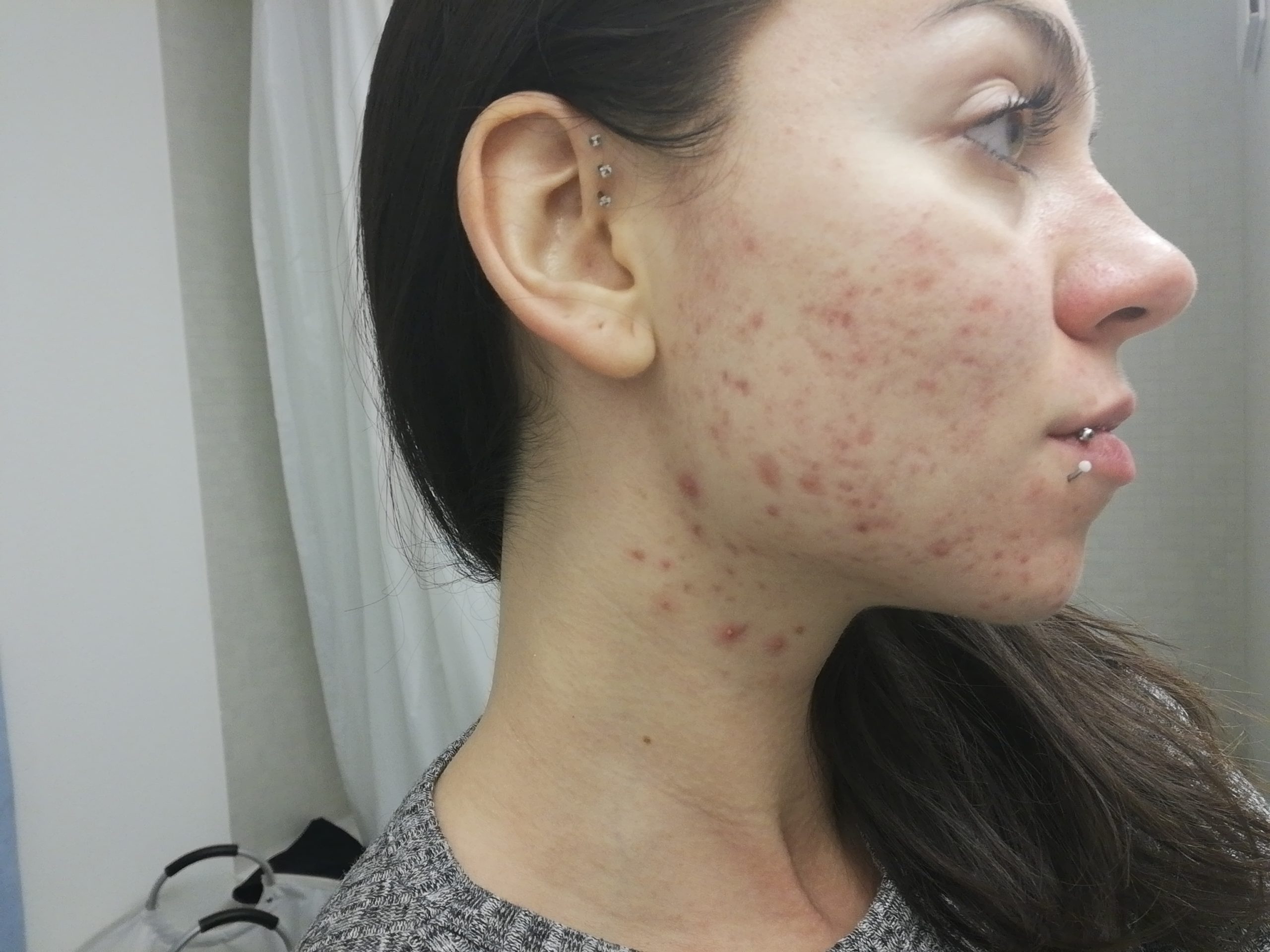
I felt absolutely awful and lost.
My acne was super painful, and I had no idea what to do. I’d spend hours and hours on Google, sometimes until 2 or 3 in the morning, just reading every article I could find.
So, if that sounds like you, know that you are not alone. I completely get it.
It’s not only the frustration of never seeing anyone with acne on social media, in ads, or on TV shows (unless they’re, like, teenagers, lol). It’s also the frustration of not being taken seriously or even truly helped by professionals.
The reality for me and many of my readers is that some doctors, dermatologists, or gynecologists tend to offer temporary fixes that don’t actually address the root cause.
We’re talking about skincare, birth control pills, or even strong (and sometimes dangerous) treatments like Accutane.
While these solutions might seem like magic and feel like they work for a few months or even years, when it comes to hormonal acne, they’re really just temporary. They don’t fix the underlying issue.
I really want to make it clear that everything I’m going to share in this article is solely based on my own experience and is specifically about hormonal acne.
Please remember, every body is different, and this definitely isn’t a substitute for professional medical advice.
How to Recognize Hormonal Acne
First off, hormonal acne typically shows up on the lower part of your face—think your chin, jawline, and neck. Personally, I also got a lot of acne on my back, but that’s not necessarily the case for everyone.
Hormonal acne isn’t just those little pimples you can pop and that disappear after a few days. Nope. We’re talking about micro-cysts that you absolutely cannot pop. They stick around forever and are super painful—I remember even wearing a scarf in winter hurt like crazy 🙁
And finally, since it’s hormonal, this type of acne will pop up when you’re experiencing hormonal changes. This could be a big shift, like when you stop hormonal birth control, or it could simply be the normal hormonal fluctuations you go through during your cycle.
I’ll explain you below that depending on when your acne appears in your cycle, you might be able to figure out which of your hormones are out of whack.
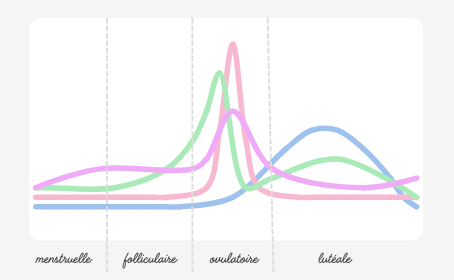
My Rollercoaster Ride with Hormonal Acne
Before I dive into how I cured my hormonal acne naturally, let me tell you a bit about my own chaotic journey.
Something to note is that I’ve always had acne-prone skin. So, I’ve always had a breakout here and there, and it definitely gets worse whenever there’s any kind of imbalance in my life.
But things really went south with my acne around August 2018—that was about 8 or 9 months after I stopped taking birth control.
I had been on the pill for four years, and when I quit it at the end of 2017, my body completely freaked out. I also lost my period.
It took a solid 8 or 9 months, until August 2018, for my period to finally come back. And that’s exactly when I had a huge acne flare-up, precisely because my body started trying to produce its own hormones again.
What happens when you’re on hormonal birth control is that your natural cycle pretty much shuts down. Your body either produces very few or no hormones on its own.
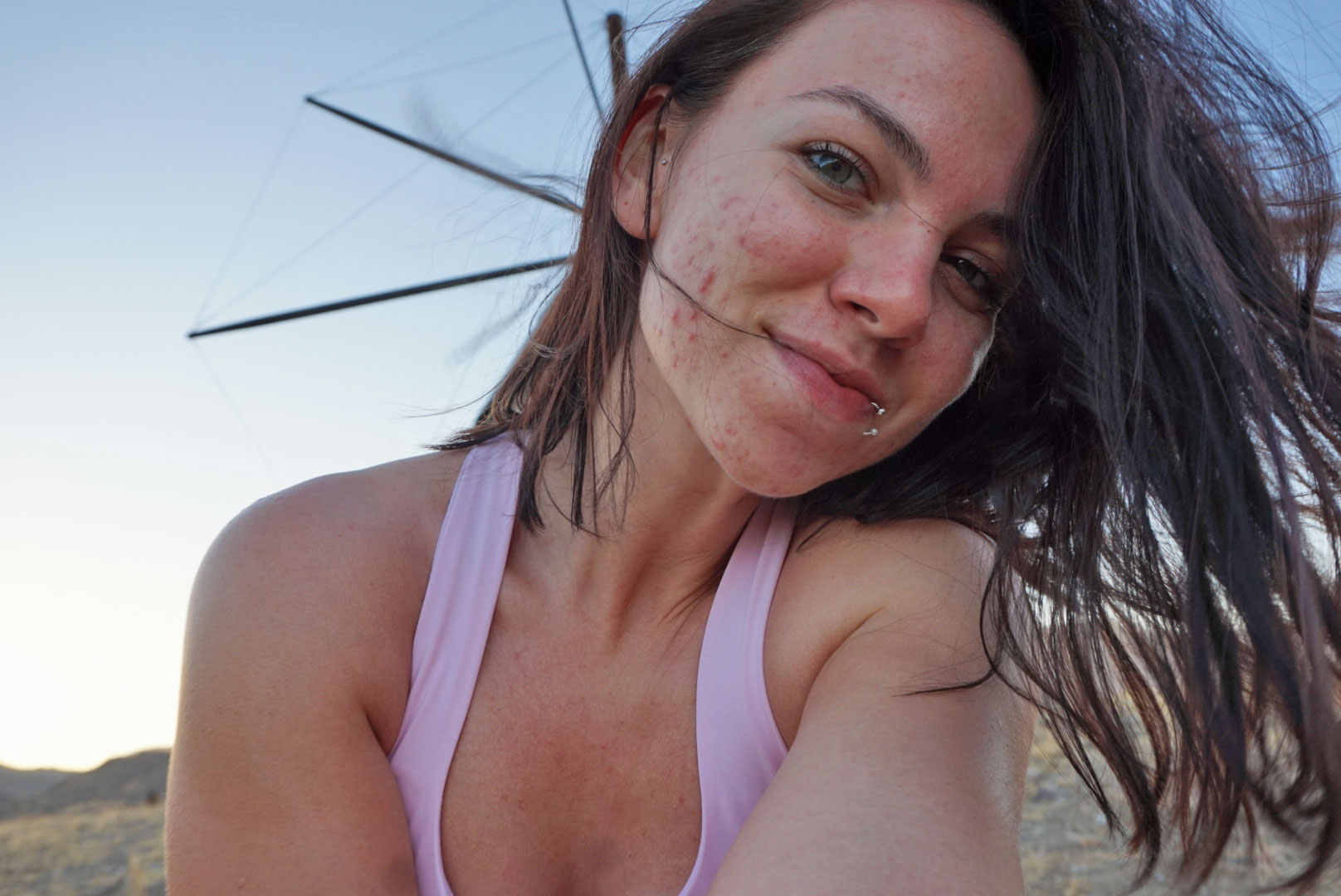
August 2018
I was aware that my acne was tied to my cycle, so I figured, “Okay, now that my period’s back and everything’s getting back to normal, this acne should clear up.”
Yeah, right.
August came and went, then September, October, November… and my acne wasn’t getting any better. In fact, it felt like it was just getting worse.

November 2018
At that point, I was absolutely desperate. I didn’t know what else to do, and after everything I’d gone through coming off the pill, there was no way I was getting back on it.
I was dead set on finding a natural treatment.
So, I decided to go see a naturopath, who, to be honest, didn’t really take me seriously at first (lol).
I literally had to show him what my acne looked like under my makeup before he’d even give me something to treat the inflammation. In the moment, I didn’t really try to understand what it was; I just wanted anything that would get rid of this acne.
Four months later, I started seeing some results. By June 2019, six months after starting the treatment, my skin was finally looking relatively clear. I still got some pimples, but I felt like living again.
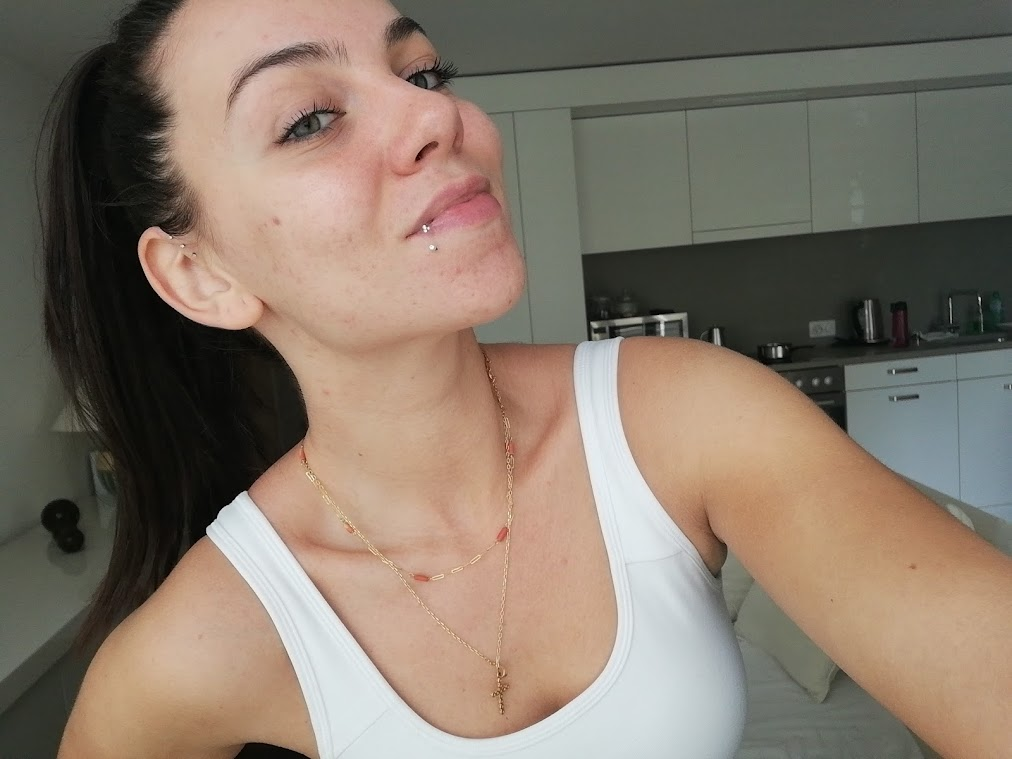
June 2019
By September 2019, I barely had any pimples left. My skin stayed pretty stable throughout 2020 and 2021. At that point, I truly thought the problem was solved for good.
But life always has a way of surprising you, doesn’t it?
In October 2022, I went to live in Spain for a month, and my acne started to reappear.
It would come back in waves, and I couldn’t quite figure out why. This went on all through 2023, and I started to lose a bit of hope again because it became so regular—every single month, I’d get acne.
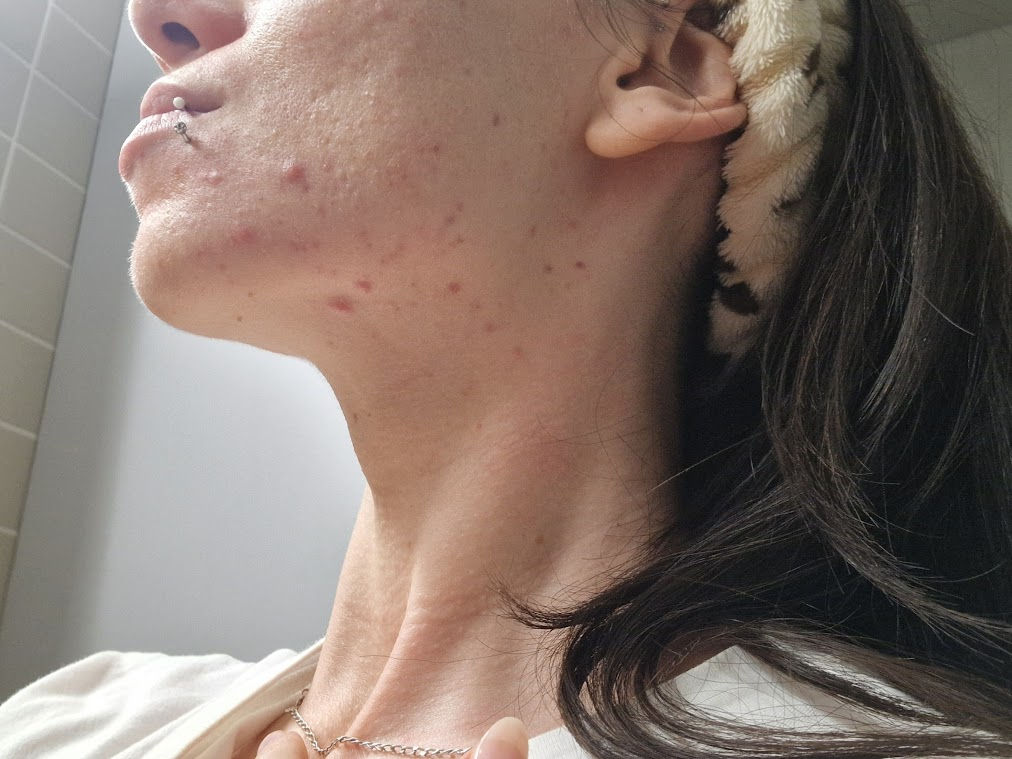
December 2023
That’s when it hit me: even though I’d seen a naturopath and focused on eating as many anti-inflammatory foods as possible—and those things did help—I realized I had never truly understood the root cause of my acne.
All I knew, especially after getting certified in women’s health, was that it was connected to my cycle and my hormonal balance.
So, in early 2024, I enrolled in an advanced course on hormonal balance.
It pushed me way out of my comfort zone, delving into super technical, medical terms and the deep biological workings of the female body. But honestly, I learned so much.
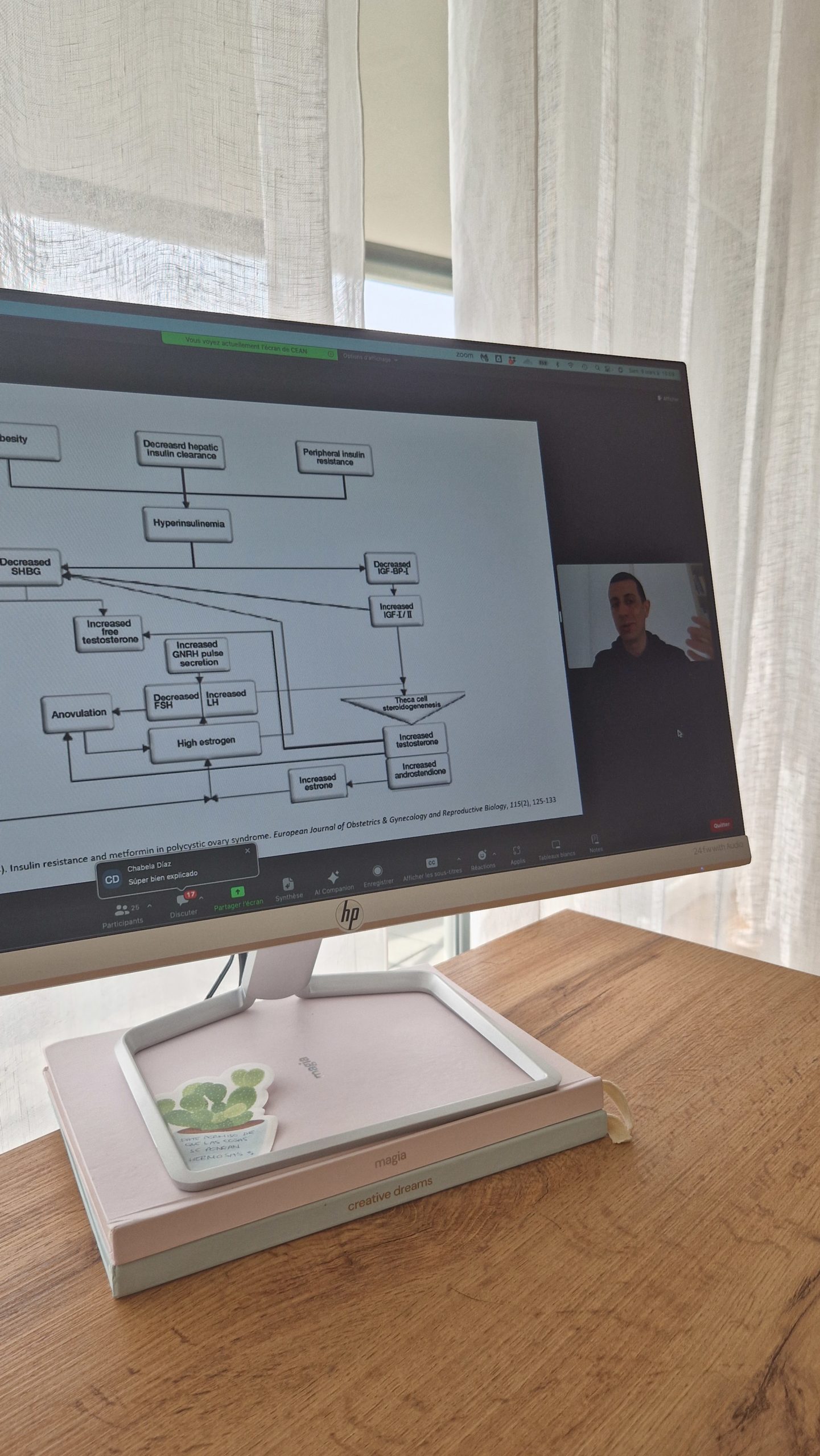
At the time, it was a real head-scratcher, haha!
This whole experience really pushed me to dive deep into cycle syncing, which is all about how you eat, work out, and live your life according to the different phases of your menstrual cycle.
Everything I learned, I applied to myself, and it actually worked.
By mid-2024, my hormonal acne officially disappeared. Since then, my skin isn’t perfect, but it’s pretty much totally clear.
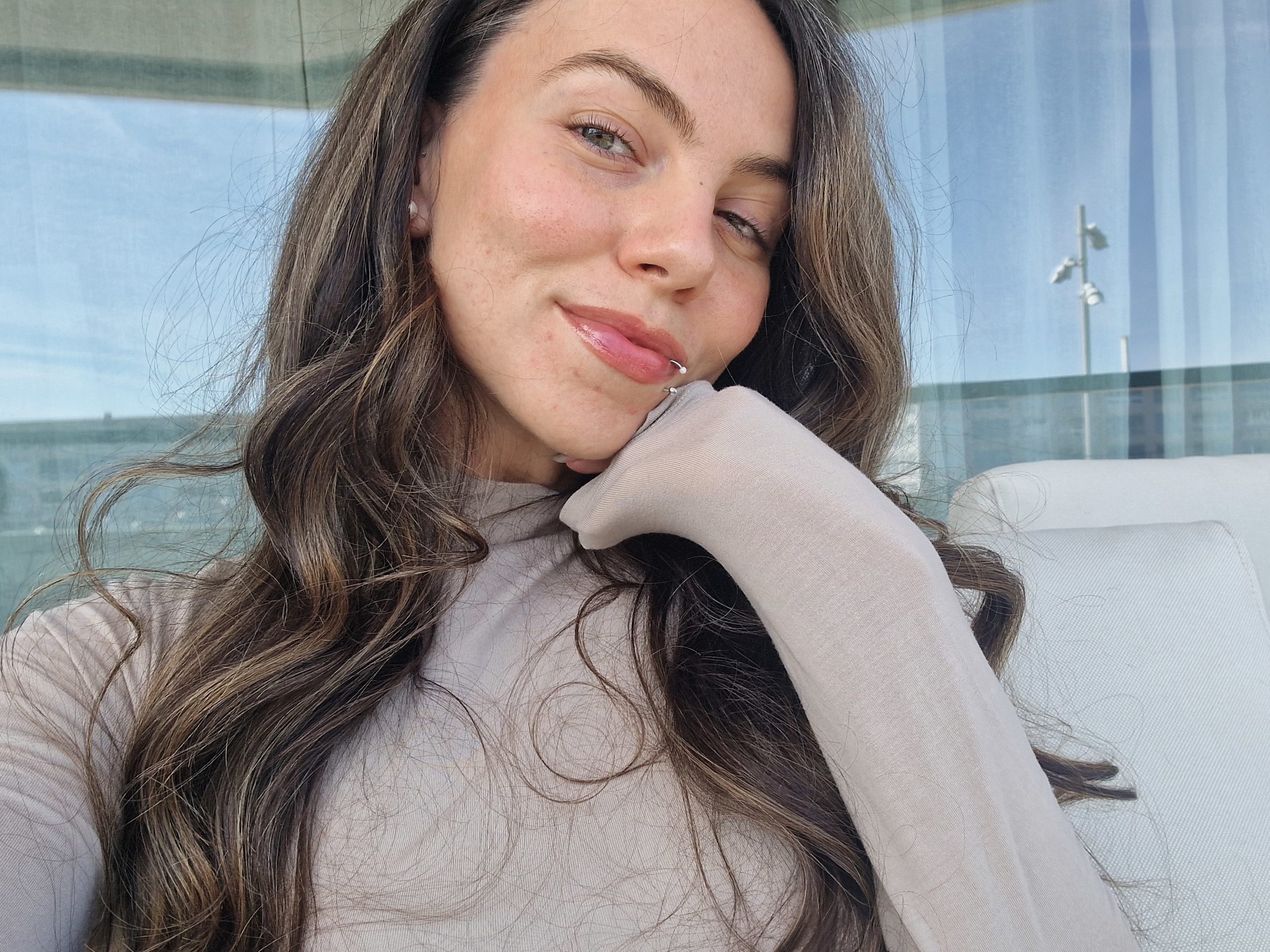
April 2025
The Real Goal Isn’t Just Acne-Free Skin
The most important part of my story isn’t that I have clear skin now. The most important thing is that I finally understood where my acne was coming from.
This means that if it comes back for whatever reason (and it absolutely can at any time), I now have the resources and knowledge to figure out what’s causing it and how to address it.
That’s truly what I want to give you through my knowledge and content.
I don’t just want to recommend some “external” solution, like a product that only helps for a little while. That kind of thing makes you dependent. And if that solution stops working for you down the line, you’re back to being lost and completely out of sync with your body.
That’s exactly what happens with the birth control pill. We’re prescribed it to supposedly treat hormonal acne, period pain, and irregular cycles.
But what happens when you stop taking it for any reason? All those symptoms come right back, and you’re back to square one.
All of this happens because we’re not taught how our own bodies actually work. As I said before, we’re given solutions that just hide the problem, without ever really getting to the root cause and treating it from there.
And here, the real problem we need to address is hormonal balance.
The Root Cause of Hormonal Acne
If you’re dealing with hormonal acne, it’s because one or more of your hormones are out of balance.
The amazing thing about listening to your body, understanding your cycle, and not being on hormonal birth control is that you can often figure out which hormones are imbalanced based on when your acne flares up.
Maybe you’ve never noticed before, but generally, there will be specific times of the month when you experience big breakouts or see new pimples pop up.
If you have no idea when your acne tends to be at its worst, I highly recommend you start paying attention: note in your planner or cycle tracking app when new blemishes appear.
After a few months, you’ll likely notice that it usually happens around the same time in your cycle, a clear sign that your body is trying to tell you something.
In many cases, acne flare-ups will appear either during ovulation or during your luteal phase.
Acne During Ovulation
If you’re getting acne during ovulation, usually around the middle of your cycle (think day 14 or so), that could be a sign you have an excess of estrogen.
During this phase of our cycle, we naturally have a surge in estrogen, which helps our bodies ovulate and become fertile.
This peak, however, can become a problem if your body isn’t effectively eliminating these hormones once they’re no longer needed.
So, if that elimination isn’t happening properly, you end up with an estrogen excess that can cause inflammation throughout your body and, of course, in your skin.
Acne During Luteal Phase
If your breakouts happen during the luteal phase, that might indicate an excess of androgens.
This excess can trigger your sebaceous glands to produce more oil, which typically leads to oily skin, clogged pores, and thus, more acne.
An excess of androgens can be caused by low progesterone levels, but it can also be linked to chronic stress or insulin issues (often due to a diet high in refined sugars and processed foods).
Acne During Your Period
Often, if you’re already experiencing acne during your ovulatory or luteal phases, there’s a good chance it’ll worsen during your period because your body is exposed to even more inflammation.
So, the first step is truly understanding which hormone(s) are out of balance and figuring out the root cause.
Quick Recap
To simplify things as much as possible and cover the most common scenarios:
- Either you have an excess of estrogen because your body isn’t able to eliminate it properly.
- Or you don’t have enough progesterone because your body isn’t producing it, often due to stress.
- Or you have an excess of androgens because your body can’t eliminate them, isn’t producing enough progesterone, and/or because you have insulin resistance.
Of course, the only way to know exactly which hormones are out of whack is to get a hormone panel, like a DUTCH test.
You often won’t see these imbalances in standard blood tests because hormones fluctuate so much. So, depending on which hormones you suspect are imbalanced, you’d need to do blood tests at very specific times in your cycle, since our hormones are changing week to week.
I don’t know about you, but before a blood test, no one ever asked me where I was in my cycle.
The result was that when I had my acne and tons of other problems related to my hormones, my blood tests came back totally normal. It was incredibly frustrating because there was clearly something not working right in my body.
So, if you have the opportunity and the means, and if you can find a professional who can run and interpret a hormone panel for you, I highly recommend doing it. That way, you’ll know precisely what’s going on.
If you’re not in a position to do that, then you can still decode these hormonal imbalances by observing and listening to your body. That’s what I did because it was the only option I had left.
This process of understanding my hormonal imbalance, the cause of my acne, and healing it naturally took several years because I was starting from scratch.
But I really hope the advice I’m about to give you here helps you save years and clear up your acne as quickly as possible.
The Solution: Balancing Your Hormones
The solution for healing your hormonal acne is to balance your hormones.
Whether that means:
- eliminating excess estrogen
- producing enough progesterone
- and/or regulating androgen levels
All of this can be done completely naturally through dietary changes, cycle syncing, and stress management.
I’m going to explain all of this in detail, but it’s important that we consider these three things.
I know it might seem like a lot to manage all at once, but the good news is that everything is connected.
So, when you start living in sync with your phases, and when you start avoiding certain foods at certain times, you’ll naturally reduce your stress levels.
When you reduce your stress levels, you’ll naturally crave less foods that aren’t necessarily good for you or your acne. This means your acne will improve, you’ll worry less about your appearance, and you’ll also feel less stressed.
Improving one aspect of your health will directly contribute to another.
If you’re starting this process of balancing your hormones, managing your stress, and living according to your cycle, try not to do and fix everything at once.
Start with what seems simplest, most accessible, and most realistic for you.
You’ll also find all my tips for each category below.
Treating Hormonal Acne with Diet
Quick heads-up: every body is different, and that means each person will react differently to various things and foods.
Just because something makes my acne worse doesn’t mean it’ll have the same effect on you.
I’m just here to give you ideas of what might worsen or improve your acne, but the most important thing is for you to test it on yourself and do your own experiments with your body.
Your body is always right and will always tell you the truth. Your job is to interpret it and learn to communicate with it.
Foods That Can Worsen Your Acne:
- Dairy Products: They contain the hormone IGF-1, which stimulates androgen and thus sebum production. This clogs pores and leads to acne. Dairy can also be inflammatory for some people, especially those who have trouble digesting lactose or casein.
- Wheat and Other Allergens: For certain individuals, wheat can cause inflammation in the intestinal lining (and this goes for any other foods you’re allergic to or can’t tolerate). Since acne is already an inflammatory condition, anything that creates more inflammation will worsen your acne.
- Simple and Refined Sugars: These can trigger an insulin response, and just like IGF-1, insulin increases sebum, which clogs pores and leads to acne.
- Saturated Fats: Found in chips, deli meats, fried foods, pastries, and again, industrial pre-made meals and processed foods.
- Coffee: It stimulates the stress hormone (cortisol), which can prevent adequate progesterone production, potentially creating a hormonal imbalance. Coffee can also disrupt digestion and interfere with the absorption of certain vitamins and minerals like iron, magnesium, and B vitamins, all of which are essential for hormonal balance and clear skin.
- Alcohol: Also inflammatory, it raises our cortisol levels, and as we know, alcohol overloads the liver. This can lead to a buildup of hormones, resulting in hormonal imbalance and acne.
All that being said, I don’t want you to get scared or discouraged if you currently eat all the foods I just mentioned.
The goal isn’t necessarily to eliminate everything and be super strict with yourself, but rather to be aware of what certain foods can do to your acne.
As with everything, it’s about balance. If you start following a super strict diet and become afraid to eat certain foods, that also creates stress in your body, and stress, too, worsens your acne.
In my opinion, what you need to do is find your own balance. Eat as much variety as possible, focusing on unprocessed, anti-inflammatory foods.
Then, figure out for yourself which foods cause or worsen your acne and how much you can eat without significantly affecting your skin.
Personally, I’m lactose intolerant, and dairy products definitely cause me acne. But that doesn’t mean I never eat cheese or that I’ll deprive myself of tiramisu at a restaurant just because I love it.
Now, when I do eat those things, I’m aware of the potential consequences for my acne. When I eat these types of foods or drink alcohol, I make a conscious choice.
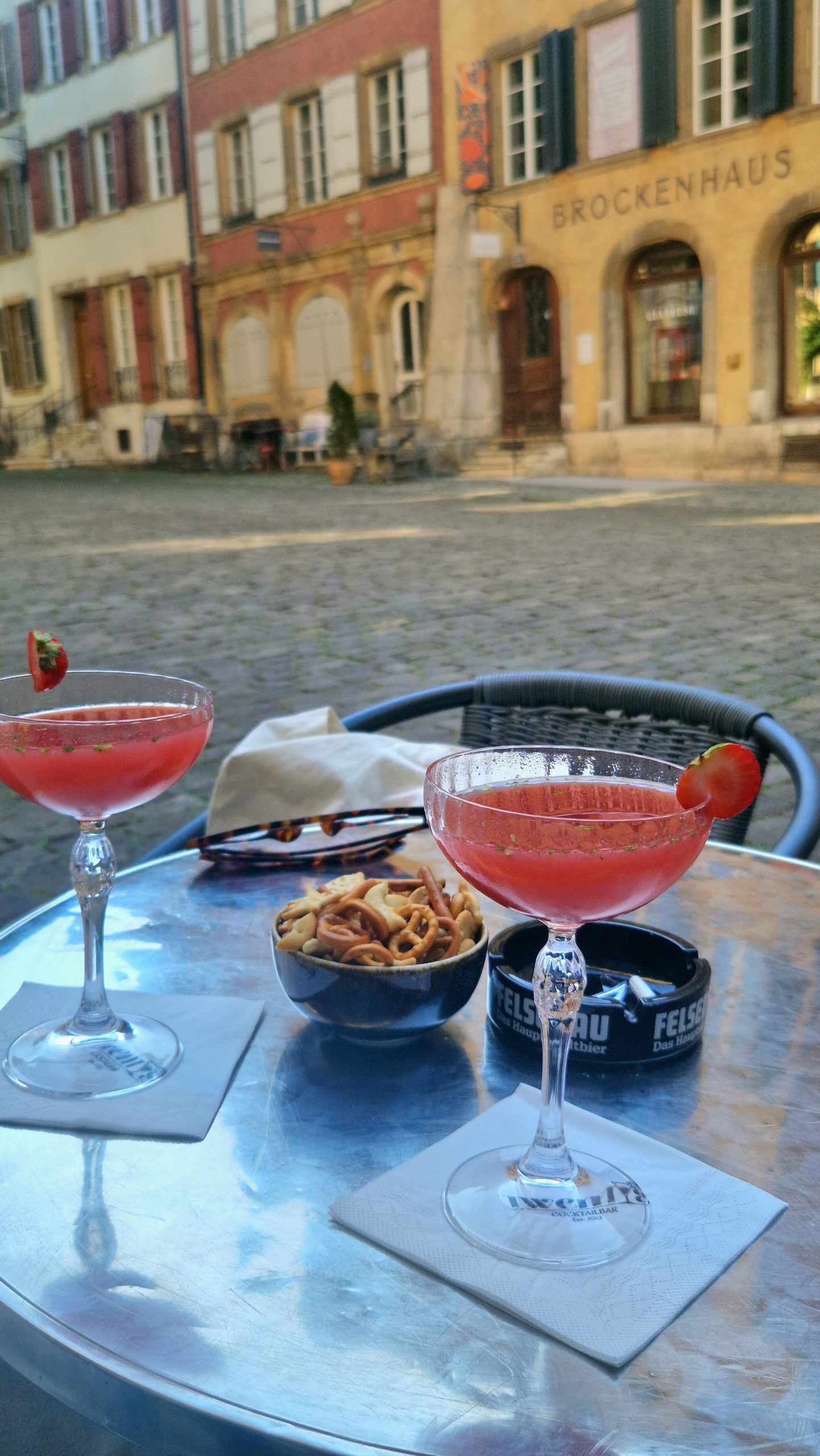
we believe in balance here 🙂
Foods That Can Improve Your Acne:
- Anti-inflammatory Foods: To reduce inflammation and promote hormonal balance. This includes fatty fish, berries, all types of vegetables, and nuts.
- Fiber-Rich Foods: To support your gut microbiome and ensure you’re properly eliminating excess hormones. This includes legumes, whole grains, fruits like apples and pears, and vegetables like artichokes, broccoli, or carrots.
Of course, all unprocessed foods, all fruits, vegetables, and nuts are absolutely beneficial for your acne and your overall health.
Treating Hormonal Acne with Supplements
Certain supplements can also support your skin and hormonal balance.
It’s important to remember that, as we know, supplements are meant to supplement your diet. So, your foundational diet should already be of good quality.
If your diet isn’t well-balanced, simply taking supplements isn’t going to clear up your acne, because they’re not magic pills (I say this because I believed that for a long time myself!).
Below, you’ll find a list of supplements that are particularly beneficial for hormonal balance and acne, based on the causes I mentioned earlier.
Always ask for professional advice before taking any type of supplement.
- Omega-3s: These help calm skin inflammation, support hormonal balance, and improve skin quality.
- Vitamin B5: It can help reduce excessive sebum production, which may decrease acne.
- Zinc: It aids in regulating androgens, reducing inflammation, and supporting skin healing.
- Milk Thistle or DIM: These help support the liver, which, as we discussed, plays a key role in eliminating excess hormones.
- Ashwagandha or Rhodiola: As adaptogens, they help the body better manage stress and regulate cortisol. You can also find them in other supplements, for example, in this plant-based protein powder (which is my favorite).
These links are affiliate links. If you choose to purchase these products on iherb.com, use code CBY2374 at checkout for a little discount 😉
I personally order all my supplements and much more from this website (plus, if you’re ordering from Switzerland, customs fees are already included at checkout, so no surprises!).
Treating Hormonal Acne by Managing Stress
Stress is a huge topic because we all know how bad it is for our health, but we don’t always realize just how much it affects us.
Turns out, stress isn’t just about work or exams. I thought that for a long time, but I had to learn the hard way that stress also includes:
- Being in relationships that don’t uplift you
- Having low self-esteem
- Doing overly intense workouts
- Not eating enough or having an unhealthy relationship with food
- Constantly putting pressure on yourself, being hard on yourself
- Being in a career that doesn’t satisfy you, dreading your Mondays
- Living for others, following societal expectations rather than what you truly want deep down
That’s why, through my online presence, I talk not only about hormonal balance and feminine health, but also about self-esteem, self-confidence, listening to your body, trusting your intuition, and daring to follow your dreams.
Because once again, everything is connected.
If you don’t feel good in your body, in your relationships, or in your career, it’s going to create stress, and that will absolutely affect your hormones.
The result? It’s going to affect your hormonal acne, your period pain, your PMS, and all those things we’ve been told are normal for women, when they’re not at all.
All these symptoms are signs from your body that something isn’t balanced in your life.
In my case, the big acne flare-up I had in 2018 was obviously linked to stopping the pill, but it wasn’t just that.
It was also very much connected to the fact that my mental and physical health weren’t very stable, that I was incredibly hard on myself, that I hated myself.
And I didn’t really notice it before because I was on the pill, so my symptoms were hidden.
When my acne reappeared in late 2023, it was during a period when I had a lot of stress coming from multiple places.
The fact that my acne came back was my body telling me: you’re not on the right path; you need to let some things go; you need to make your well-being and your dreams your priority.
The truth is, this is not always an easy journey. It’s inner work that requires courage, it’s not always visible, and it’s certainly not applauded by society.
Of course, it would be simpler to just take a pill and not think about it, but when we try to hide or ignore certain things our body is trying to tell us, it always comes back stronger.
So, if you have acne right now, yes, it’s important to have a good diet, and yes, it’s important to have a balanced lifestyle.
But I also want you to think beyond that and ask yourself:
- What is your body trying to tell you?
- Are you satisfied with your life?
- How do you talk to yourself daily?
- Are you putting pressure on yourself to achieve certain things? To be a certain way?
- If so, is that truly what you want deep down?
If you know me a little, you already know that writing is my favorite way to recenter myself, to listen, and to truly understand what I want deep down.
I really recommend taking these questions and answering them on paper, or even writing a few times a week, morning or night, to help you reconnect with yourself.
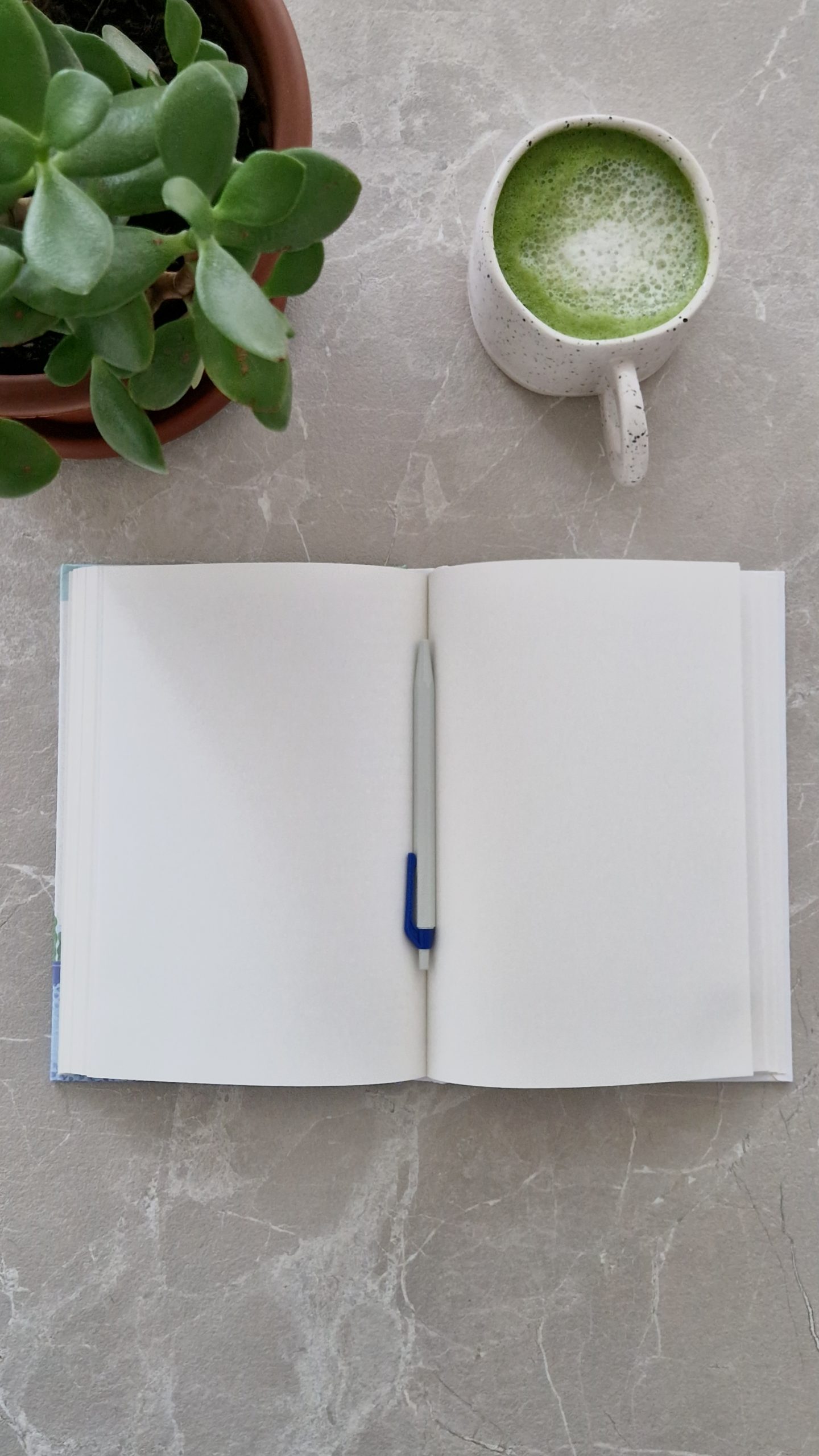
Treating Hormonal Acne with Cycle Syncing
The last method I want to share for balancing your hormones to heal your hormonal acne is cycle syncing.
Cycle syncing is a method created by nutritionist Alissa Vitti, which involves adapting not just your diet but also the rest of your life to the phases of your menstrual cycle.
It’s a method I use, that works for me, and that works for many other women, and it’s no accident.
Why? Because we have four phases in a single cycle.
During each week of our cycle and month, different things are happening in our bodies because our hormones are fluctuating.
During certain cycle phases, our body produces certain hormones. In others, it needs to eliminate some and produce others.
As we’ve seen, if you have acne, it’s mostly because your body isn’t able to eliminate certain hormones, or it’s not producing enough.
And the good news is that we can support our bodies in each cycle phase with specific foods and practices. This helps your body produce enough hormones when needed and eliminate them when they’re no longer necessary.
I won’t go into too much detail here because I have an article where I explain the basics of the four cycle phases, and I highly recommend looking into this topic because it’s what allowed me to heal my acne.
What you need to know about living in sync with your cycle specifically to heal your acne is that each cycle phase has different nutrient needs, different stress tolerance levels, and also different boosts in skills.
What I particularly want to highlight in relation to acne are the points I mentioned earlier: diet and stress.
Learning to live in sync with your cycle will help you reduce your stress and eat the right nutrients at the right time.
As we saw before, some foods will help you reduce inflammation and eliminate excess hormones, while other foods will worsen your hormonal balance.
But what’s crucial to understand here is that some foods will have a different effect depending on the cycle phase in which you eat them.
For example, many women can tolerate drinking coffee during their follicular and ovulatory phases and feel fine when they drink it.
But when they drink coffee during their luteal or menstrual phase, they become much more anxious, experience more pain, more acne, etc.
This is no coincidence. It’s because in the luteal and menstrual phases—during and just before our periods—our bodies are less tolerant to stress due to the hormonal fluctuations happening at that time.
Another example: if you have an excess of hormones, it will be particularly important to eat fiber when you have hormone peaks, for instance, during the ovulatory phase.
Eating according to your cycle phases, by adding certain foods to your diet, will allow you to provide your body with the right nutrients at the right time.
I know this can seem complicated at first, which is why I created this article on the topic as well.
To continue on the topic of cycle syncing, it’s not just about what you eat, but also about what you do daily (and how you do it).
Typically, we’re talking about exercise.
If you have acne and you’re working out six times a week at high intensity, regardless of your cycle phase, like I used to, then maybe it’s not actually benefiting your hormones.
Maybe it’s even what’s causing your acne.
Again, that’s because during our luteal and menstrual phases, our bodies are more sensitive to stress. They need more rest, and they also need more calories.
So, if you push yourself to do high-intensity workouts and don’t eat enough, particularly during these phases, you’re creating stress in your body. And your body will prioritize producing cortisol (the stress hormone) over your sex hormones, which will create a hormonal imbalance and, among other things, cause your acne.
That’s why, generally speaking, it’s super important during the luteal and menstrual phases to listen to your body and not be afraid to work out less, do lighter exercises, or get more sleep.
Because even if society and fitness gurus tell us we need to be consistent and never miss a workout to get the body of our dreams, that very mindset can also cause our hormonal imbalance, our inflammation, our inability to lose weight, and our acne.
But that’s not all; living in sync with your cycle also includes your work and social life.
For instance, our follicular and ovulatory phases are when we have the most energy, are most social, and communicate best. So, that’s the ideal time to go to events, see people, and give presentations.
But if, for example, you cram your luteal and menstrual phases with social events and outings—phases when we’re generally more introspective and need to be alone and calm—then that’s also likely to create stress. You’ll be forcing yourself to do things your body doesn’t necessarily have the desire or energy for.
Of course, these aren’t fixed rules. Ultimately, living in sync with your cycle means learning to listen to your body.
This is what I will always, always, always emphasize, because we are all different. So, the key is to learn to understand yourself, to listen to yourself, to reconnect with yourself, and to trust your body and your intuition.
A Word of Encouragement
I truly hope this article has helped you and given you hope that, yes, you absolutely can heal your acne naturally.
And in the meantime, please don’t be too hard on yourself.
I know it’s not easy to look in the mirror when your skin looks nothing like what you see on social media or in ads, but I want to remind you that:
- What you see online and on TV isn’t reality. These days, it’s super easy to cover up acne with makeup or even completely erase it with editing apps.
- You are so much more than your skin and your physical appearance (!!!) — people love you for who you are and how you make them feel, not for the quality of your skin.
Personally, having acne was the experience that both most affected and most strengthened my self-esteem.
Because suddenly, in my head, I didn’t have my looks to please others anymore, and that really pushed me to find my worth elsewhere, to find my value deep inside myself rather than on the surface.
Ultimately, I tell myself that if I hadn’t had so much acne and suffered from it so much, I don’t know if I’d have as much self-confidence today.
Don’t forget that even with acne, you are enough, you are capable, and you can do anything you want in this world.


